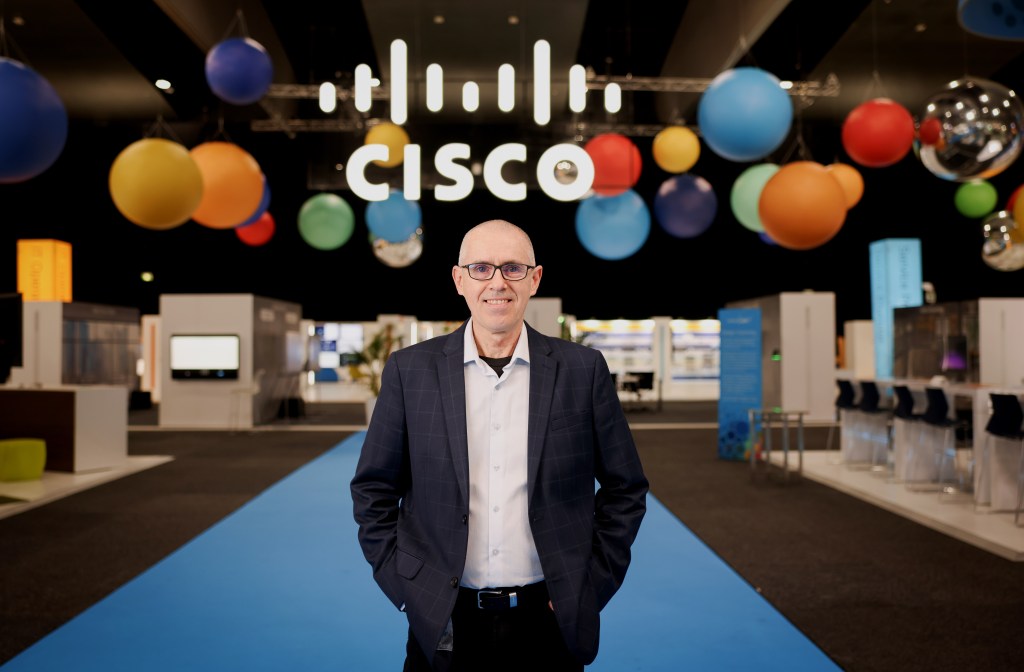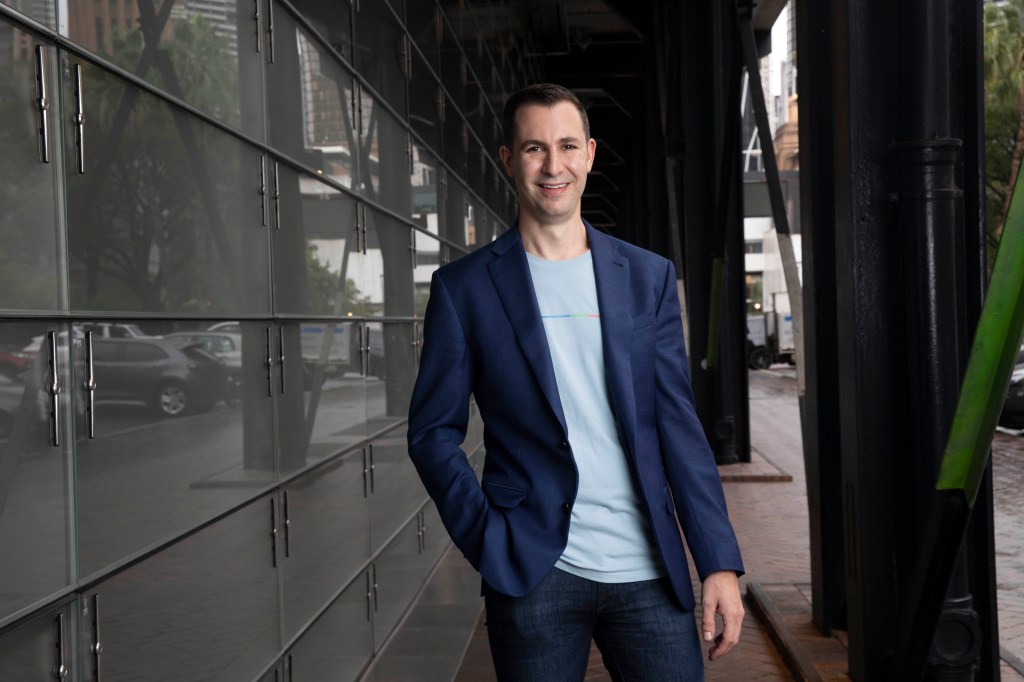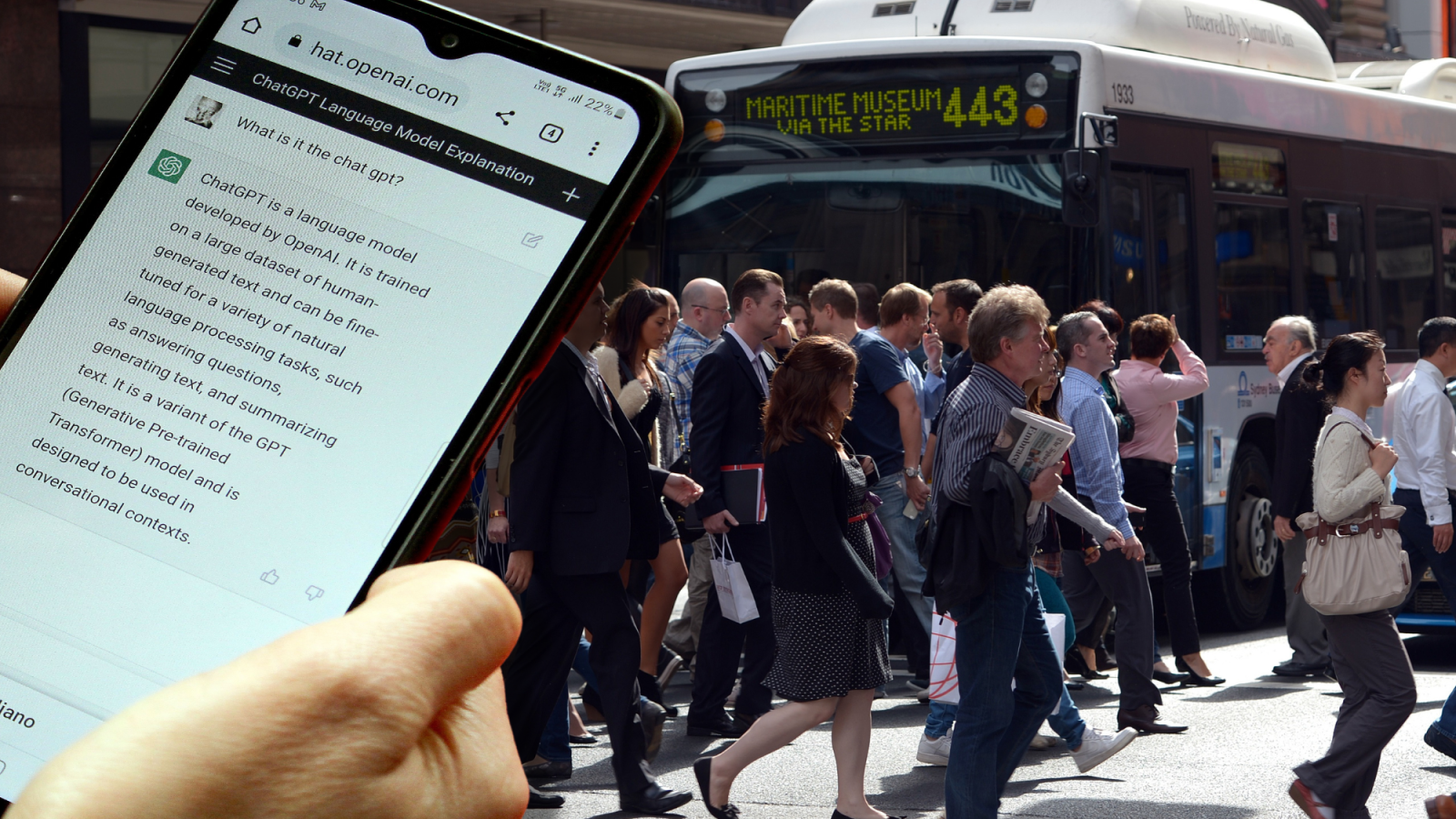The jury is out on whether technology such as ChatGPT will take jobs from human workers or free up time to build better relationships with customers and clients.
James Larmer is a global leader in advanced data and analytics and AI. A Partner of Bain & Company, Larmer is driving the expansion of its Advanced Analytics capabilities in Australia and Asia Pacific. He says, “It’s our view that Generative AI will ultimately create more jobs than it displaces; however, as with all significant shifts, there will be a transition period for business. Successfully deploying Generative AI requires more than a great technology model. Companies will need to grapple with many challenges, such as timing, integration complexity, talent availability, data governance and privacy and investment.

“Taking a longer-term view, AI is expected to add trillions of dollars to global GDP over the next decade, a decided benefit for Australia and the broader region. The positive impacts on speed, efficiency and insights into complex problems can help to create new roles or redefine existing jobs. Generative AI can also lead to completely new business models, products and services.”
He says AI is poised to be the defining technology trend for all businesses, driving trillions of dollars in economic impact through enhancements in labour productivity, increased revenue and customer satisfaction, as well as increased efficiency, quality and greater personalisation.
“As we think about the broader impact of AI, several key business implications come to mind:
- A significant enhancement to existing products and services, as companies extend and better their use of data and digital assets
- New products and services as businesses leverage AI advances to capture underserved customer needs, in the same way Uber emerged from the smartphone
- Changes in market dynamics driven by shifts in consumer preferences as well as regulatory policies
- More efficient and effective business processes, driving increased competitiveness
- Disruption of traditional business models with the rise of digital platforms powered by AI
- Talent and workforce shifts, particularly as we consider a business’s ability to attract and retain employees with the skills and experience to adapt to AI’s opportunities.
“Sectors such as Financial Services, Telecommunications, Automotive and Healthcare, have already exhibited huge potential for high touch, high frequency, and high-value products & services enabled by AI.”
AI is already very much part of our lives as consumers, for example, using phones, maps and ride-share services; online shopping, or even parking the car. Data, computer and algorithm improvements have combined to deliver large performance jumps in tasks such as computer vision, speech recognition and natural language processing and generation. According to Bain, global investment in AI has grown 40% annually.
Carl Solder, chief technology officer of Cisco Australia & New Zealand, says the fear of AI taking jobs is not new. “In 2019, we predicted that more than 7% of Australia’s workforce would be displaced by new technologies over the next decade. Disruption has the potential to deliver great rewards to those who anticipate these shifts in the labour market and the skills that will be required.
“This was seen in the pandemic as the businesses, and people who were hybrid working realised the most rewards. It also saw a turbocharge of innovation, including the use of AI in the world of hybrid work, such as through background noise removal, optimising voices and language intelligence in video calls through Webex, propelling us to the future in which hologram calls for specific use cases is already here.

“Cisco’s been developing AI since 2011, with our first AI solution release in 2019 – an anomaly detection and troubleshooting function. Now, we’re at the next phase of the evolution, relying on AI for greater intelligence to support people connecting to applications or databases. The network can predict the decline of application experience while suggesting remediated network settings, ensuring the network experience for users is optimised, known as predictive networking.
“There needs to be a better understanding of AI – you can have the smartest AI, but without the right knowledge base behind it, it’s not going to be worth much. We’ve worked on this at Cisco by building AI in the network, and it’s ultimately to service people to work more cognitively to keep them connected. It frees up time from menial tasks to allow for more time for critical thinking and creativity.
“I urge organisations and individuals not to be afraid of AI but to embrace it – it’s not here to replace jobs but accelerate people to a desired outcome and be more efficient along the way. We’ve had times in our history when we’ve undergone fundamental changes to how we live, work and play – the calculator, internet and the iPhone – and AI is on this scale. It will change the workforce and what you do at home; we’re undoubtedly on the cusp of something seismic.”
HALO Technologies Head of Global Equity Research Clay Carter says that Artificial Intelligence is rapidly changing and transforming the world of equity investing, with considerable implications for investors and financial institutions.
“Retail investors now have access to machine learning algorithms, which can rapidly analyse vast amounts of data to identify patterns and predict market movements. This has the potential to level the playing field for individual investors, who can now access sophisticated investment strategies previously only available to institutional investors.”
Arjun Paliwal, founder and Head of Research of data-driven buyer’s agency InvestorKit, says: “Generative AI like ChatGPT will aid the real estate industry and continue to support the rise of it. As time goes on, there is still a never-ending chase to increase relationships and the human connection with customers of the real estate agencies world. As a result, agents continue to search for productivity hacks, whether in the form of mentors, checklists, scripts and more.

“The continued rise of AI will assist many of us in outsourcing the more repetitive and mundane activities such as email marketing and summarising video content into copy, whilst allowing agents across the nation to free up more time for building genuine relationships and connections that increase business success and customer outcomes/satisfaction.”

Paris Thomson, founder and creative director of luxury content studio SIRAP, says: “I predict the proliferation of Generative AI will impact the landscape and texture of jobs in our media making and content creation industry. Jobs such as copy and script writing, researching and editing will certainly be more AI-focused. However, the art of concept ideation and cinematography will continue to be more in demand from a human source. Creative ideas must consider a holistic brand and client context, nuanced through human interaction, experience and dialogue. Similarly, the role of the brand custodian or creative director, who can curate and direct a creative vision and justify it through conversation and human interaction, will be more in demand from a human resource.”
Greg Taylor, the founder of Step One bamboo underwear company, says, “We are an e-commerce company, so we constantly need to push out social media posts, ads and EDMs.
“We have found that by using ChatGPT for our ads, website copy and Instagram posts, we have been able to create and run 4 x more ad creative than previously.
“We can also put existing copy into the engine to have it repurposed. We can also change male-focused content into content more relevant to females and more. It has not only saved us a lot of time but has also given us more ideas in terms of angles to go with, as it also acts as a researcher.
“While we don’t always use the copy word-for-word, it gives us good bones to work with, and then we can tweak it to suit our bottom line.”
Tristan Sternson, CEO of ARQ Group and co-lead of NCS NEXT, says: “Generative AI is just another example of how smart tech, robots, and AI can work together to make us more productive and help us with our population problems – particularly in the tech industry, to fill jobs. We can focus AI, like Generative AI, to help some of the more cumbersome tasks so we can do more high-value tasks. For example, if Generative AI can produce the standard shell of code to create an application, we can focus on the high-value component of customising the code to its required function. This would also erode the number of errors in code, making it quicker to build something and then allow us to move on to the next piece of code. Perhaps this will accelerate our digital economy as we can build more technology quicker.

“As for other industries like services firms generating pro-forma documents, the value is not in the bulk of the standard documents; it is the focus on the key element that we want our humans to focus their expertise on. We will work out ways to use Generative AI to improve the way we work, not replace our jobs.”

Micha Kaufman, Chief Executive Officer Fiverr, says, “The world has a new creative baseline marked by the astonishing pace at which Generative AI has infiltrated our lives. It took Netflix 3.5 years to reach a million users, Facebook 10 months, Spotify five months, and Instagram 2.5 months. ChatGPT reached a million users in just five days.
“We now have new expectations of what we can consume and produce. But really, it’s important to remember that Generative AI is simply a set of tools. ChatGPT is the new AI-driven Word or Notepad, and Midjourney is the new Photoshop. That is all they are. The technology itself is meaningless without humans who use these technologies to produce new and exciting things for other humans to consume.
“AI doesn’t generate output for other AI but for humans to communicate better and more easily with each other. So, who is the hero in this story? The hero is undoubtedly, and always will be, the talented human that knows how to make the most out of tech. If we once had Photoshop artists, now we have DALE-E artists.
“The natural progression of job evolution is underway, and the possibilities are endless. Could Generative AI do your job at the most basic level? Yes, it probably could. Does that mean you should throw your hands up in despair that computers have finally taken over? No.
“Test, learn, evolve, grow. See where these new technologies can take you, your role and your industry. Don’t be daunted by Generative AI’s capabilities but embrace it. Buckle up, as the journey ahead is bound to be a thrilling ride.”
Annie Simpson, co-founder and Chief Consulting Officer at Modern People, says, “The good news is that we can focus on more of the complex and less on the mundane.
“As we delegate and automate with renewed vigour, we’ll find lower overheads, experience greater productivity, and generate better quality data to make informed decisions based on shared resources. This is becoming increasingly important in an environment where senior leaders report growing daily concerns, year after year. We need more brain space for the things that count.
“The bad news is that leaders are at risk of losing their voices through non-human generated content, and with that, there is the potential for lack of accountability. The rise of AI marks some human decision-making being replaced by algorithms, resulting in a lack of personal responsibility and ownership. Additionally, algorithms are inherently designed to determine “right” from “wrong”, leading to unconscious bias and one-dimensional thinking. This can result in more decisions based on an incomplete understanding of a situation. Think: “it wasn’t me – I wrote the prompt and trusted the bot.
“The unknown is the impact on future leaders. How will leaders from different generations broach this disrupter? What does mastery actually look like in this space? Will this shift leave us with new challenges in leadership ineptitude? As technology continues to evolve, we must consider what we’re teaching and modelling. We must find a balance between embracing the benefits of technology while also being aware of its potential limitations and consequences from using it without thought.”
Related content
James Arnold, Head of Marketing at tech-driven non-bank lender Bridgit, says: “I don’t believe it will lead to a huge rise or decrease of marketing jobs. It will simply change job descriptions, and the skill sets required of certain marketers. I expect to see the AI specialist title start to pop up more and more and a new skill listed in resumes, ‘ChatGPT expert’.

“Right now, the immediate use has been for content writing, collecting information on specific topics and building the constructs to a blog. But this has flaws; search platforms can identify how original your content is and will impact how you rank across these platforms. Plus, consumers can often tell unless it is well-edited.
“The influence on marketing is just the tip of the iceberg. In the long term, marketing won’t be the main business function that AI will impact. It will soon be embedded into business operational systems, customer communication systems and how we communicate with each other daily, all with the intention of driving more efficiency and reducing cost. Right now, there is even a sales tool that replicates your voice so you can blast huge audiences with voicemail.
“Smart marketers will start thinking about how they can use this within their marketing program to drive efficiency, but it won’t be taking anyone’s position and definitely won’t be used by all. A good marketer can’t be replaced. They don’t work robotically, the industry is about creativity, understanding the intricacies of your customers and the ability to think differently from your competitors. I don’t think AI would ever be able to replicate these principles. Otherwise we may all end up saying the same thing…But I could be proven wrong.
“What I am looking forward to is when we start seeing disclaimers on the bottom of ads: ‘This was written by a machine’.”
AJ Kavanagh, Head of Marketing at Rate Money, a home loan provider specialising in self-employed Australians, says: “ChatGPT is, without doubt, a phenomenal piece of software. In its current form, can I see it influencing employment within the mortgage industry? Most likely not would be my response, although I strongly believe that AI-powered tools will soon replace mundane activities such as data entry in the not-too-distant future.
“Overall, I can’t see it having a significant impact on employment within the mortgage industry, but what it can progress into, whatever that looks like will definitely impact employment.
“As a workforce in general, we better get skilled quickly, or tools like ChatGPT will soon replace us. If you don’t believe me, ask copywriters how they’re feeling right now.”
Brad Bond, Head of Emerging Technologies at Mantel Group, says ChatGPT is the killer app that has thrust Generative AI technology into the mainstream and made organisations sit up and take notice.
“While we’re still in the early days of Generative AI adoption, with many businesses still considering how they can make use of technology such as ChatGPT, we’re starting to have conversations with our customers about how they can make good choices when using AI, how to develop policies around AI use and so on.

“The use of AI to develop code via apps such as ChatGPT and GitHub’s Co-Pilot is a significant step in the technology world but one that also comes with potential pitfalls. If you think about the use of AI to write articles, there are often-cited concerns around originality of thought and plagiarism, and these concerns translate to the developer world. While some source code is available for use free of charge, much of it requires the correct licencing agreement and using AI to generate code makes it very difficult to check your licencing obligations. In addition, AI code is not generated with security in mind, so we would recommend ensuring that a human also checks any code generated by AI.
“As with any new automation technology, there are always questions about how automation will impact jobs and skills. When it comes to developing code, the human element is still a necessity, so we don’t envisage Generative AI putting any developers out of a job. However, where Generative AI can benefit businesses is by increasing developers’ efficiency – developers can use Generative AI to generate code and then conduct manual checks and reviews. This frees them up to focus on other areas, alleviating some of the pressure on IT departments with the current skills gap. Humans are also required to teach others about the best use of AI and train the model to get the best outcomes. In fact, overseas, we’re seeing openings for roles such as ‘Prompt Engineer’ whose primary responsibility is prompting AI to get the best outcomes.”



